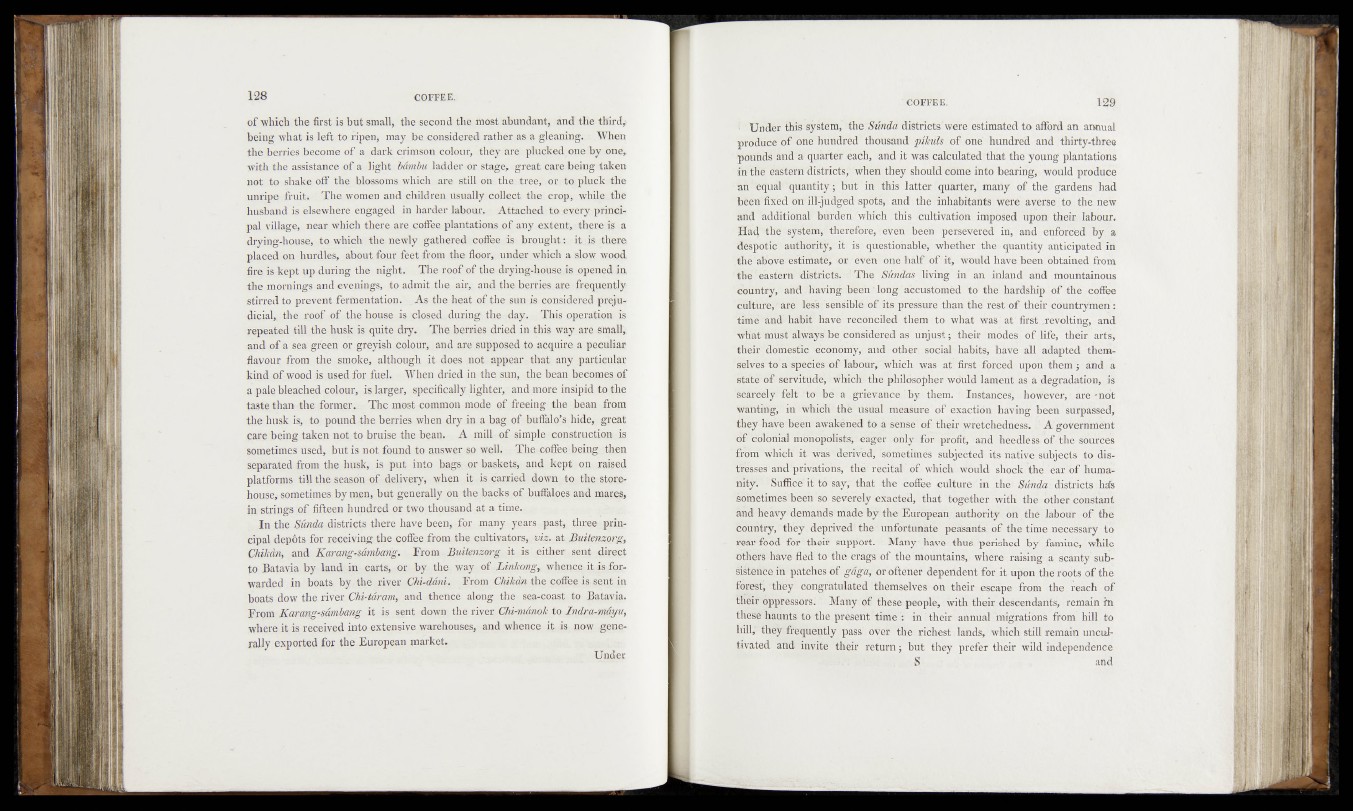
of which the first., is blit small, the seeond-.tshe most abundant* aindrfffie third?
being whSt"is4§ft-ftb' ripen; may,_beiic.ons5J^,e^ rather as a gleaning. ■ When
the berries ,becQmeL of a dark: efajussmeolour, Jfae^kre.:plucked; oflerJby: one,
with tithe assistance ofa Yi^ak-.jbdynbu .ladder or stage, .great care being taken
not to shake ojf the. blossoms .which.-.asej-still owfehe? tree, or to:pluck the
in-n-ipp.-, frijife^iEhe^whmen and children usuaHyj-collect the! crop, while,, the
husband is elsewhere /engaged-in harder labour. - Attached to^steryt.princi-'
pal village, near which fligi-eiare ebffe§ plantations .of any extent,' th^rCijS a
drying-boose, ..to which’ the.newly gather ejli/CQffeejjs-; brought^. -ifjjs there
placed -op hurdles, about four fegt^jrom the ftopr^pd&r/which a sl©$ wopd
fire; is-kept up during the night.; The rpof/.'of fh&sdrying-hopseds .opened in,
the-mornings rand evenings, to admit the^air,;: andakbe «berfies are -frequently
stirred to prevent fermentation.' -As-tbe. heat of the sun, is. considered preju^
dicial^fhe rppfjof- the house _is closed^during the day. ...This operation, is
repeated till-ithe husk is quite, dry. The~beBaes dried in this way^are-staall',.
and- of ]a green or greyish colour,^ and- are^supppsed tp, abquh^ a peculiar
flavour from.--fhe-r smoke,, although it does not appear-that any-partieui^r
kind of-wood Is.used-for fuel. When d4ed.ijvthe.spn,, the bean becapaespf
apale bleached-colour, is.larger, ..spemfically.i lighter,/ and more insipid to- the
taste than th e forrper^- Thp most common-mode of.r-freein gi^he -bean from
theihu&krisj -to pound-the berries when, dry in a bag of-/bpffalo^hide, great
care-being taken not to bruise the bean. A milh-of simple* *£onstruotjoir .is
sometimesTused, but is .not found to answer gp weHir. ■ Tb&^pffe
separatedrfrpm, the,-husk, is put in,to bags .or bagkets, and.'he.^tPftw4tffed
platforms till thgseaspp.of.-deliyery, when«,i|y is carried i_4p,wn-^tp the*stq,rp-
h.QUse,vsometimes:by mpn, but-generally on thejbacks$b% buffaloes- and anar/es,
in;'strings J,q£, fifteen hunjr^cittwo, thousand -at a time.tJtI
In.thp ^Mmdg)/distriQts.there have'been, ■ for - .many-ryears ^pas^ tlireeriprin-
cipal depbts for receiving, the coffee from the cultivators^ vi%.jfaBui$en%pj?g,
Chikdnr, and Kfkang*sambarig. , From ^Buitenzorg it is either sent rdkept
to Batavia: by-land,.-in-cajrts,a^|jfjby the way^of*XmkongM. whence itdsijfor-
warded in boats by the river Chi-dam. From Chikdn the coffee is, sent -in
boats dow the river Chi-tarant,, and thence along the- sea-coa^t- to Batavia.
Prom JCar.aftg^scmbang ■ it-jig,, sent down the -to Indra-yfi^yu,
where, it-isreceived into extensive warehouses, yand whence ,,rij^ is now generally
exported for the European market.
Under
, Under this system, the /Stónd« districts were estimated’ to afford an annual
produce’o^oTO'^nunarèd' thousMdb^zfoTs.foff-one -hundred and thirty-three
por^dsmh&'-ayqu’after ’each, and it wascalculated'that the young plantations
in^h’e ^sth'hnmiwic1fe§®pemiOTey sh ouldf^he into bearing,- would produce
an jf^ual^^Ucintity,; but malms' latter 'quarter,' many ofsthé' gardens had
’neepffixed'OWill-juaged' spöts$i a^fflSp inhabitants,w;erei averse„to,jthe.*new
ftm ’ ad diti hpalF burden./'vvhfhh, this OUltiWtiqtb imposed' up op their labour,
Ffac^the 's^s’tÊii^dtMÉefóiej^eve’n^b^eh'' péisevérea is, and - ehforceP'by. a
despoticiauthority,"it! is questionable’,7 whether in®} quantity anticipated,jB
.thé^hwerhsSimat'é; nr rêveU^ifehalf'jhffit’, * wthila. ’have-been;bbtaih.e'd', from
ih^heaslèralïditetricts. ''•Th'©1 Simads^vbig lih an inlands and mountainous
country, -and havangnheeh‘'Iong{accustomed’to1 thé hardship of the -coffee
dultufe'/cate^ ffiffijfpsenèiblé of 'its*, pressure than the rest'of* their countrymen:
tiffië 'andi'hdhif havè:fec©hciled them -tb < what was at’ fir^m®oltirig, and
^Paraniist al^awpe^consideredi asi uhiust; their modes.’oöpfe, 'their, arts;
^mei'^dbmesrac *econdmy,: and- otherrsociak habits, have-tall, adapted them-
'Sélvei^to?a''speciesvóf labour,“which - was 'atj*first forced upon them'; and a
s'tat^oWservitud^Pwhichi the philóxópi^eip^ouliPlam.ent as*a degradation,^
Warcmy!*felttytefobefei'|§lreyance byftthem. it Instances^!,nu^^^eEjf,ar.e,Vno.t
^mn^j'hin which'fth^'usual ‘measure foo'exadtiohsfhaving%b£eni,surpasse3,
1 they •have 'Bëfehrf awakéned to f *smjse i of - their wretchedness. 1' A'goverrimeUt
of?%loni2l eager only for profit, -and hëedlessi ofothefson^S
Jsometiines subjectedfats natiV^uhjecta toj dis-
^psses'ah’d^rivaUohs," tlmrecital of - whichh would shocki'the ear of huma-
say," that .the doffee culturefin the Svhdasdistricts!-hars
sometiffie's^been's’tf severely exacted; ithat'together with the- other constant
m®Rreavy- demands made by1 the, European authority^nn^thé labour^^roe
Soiïntiry,fith%yt deprived'' theunfortunate peasants og-.th&Pime necessary to
rear-food forHheir support*. *< Many have .thus perishèd by famine, while
dthéï§'-'havë>fled to'the- crags.ofathe^mountains, wfifrehraising a scanty'sub-
sptinfaè.ih' patches öfhglïgc/órbftëner dependent for it upon the rootseSf the
forektj 'they congratulated‘themselves ■ on their escape-, from -file reach of
thmfoppressors.' Many of these people, with their descendants, remain in
these'haunts to the.présent‘time : in their annual'migrations from hill to
hill,”' they?frequently pass over the richestïllnds, -which still remain uncultivated
and invite their return; but they prefer their wild independence
■ Ë H j l g M S Ü and